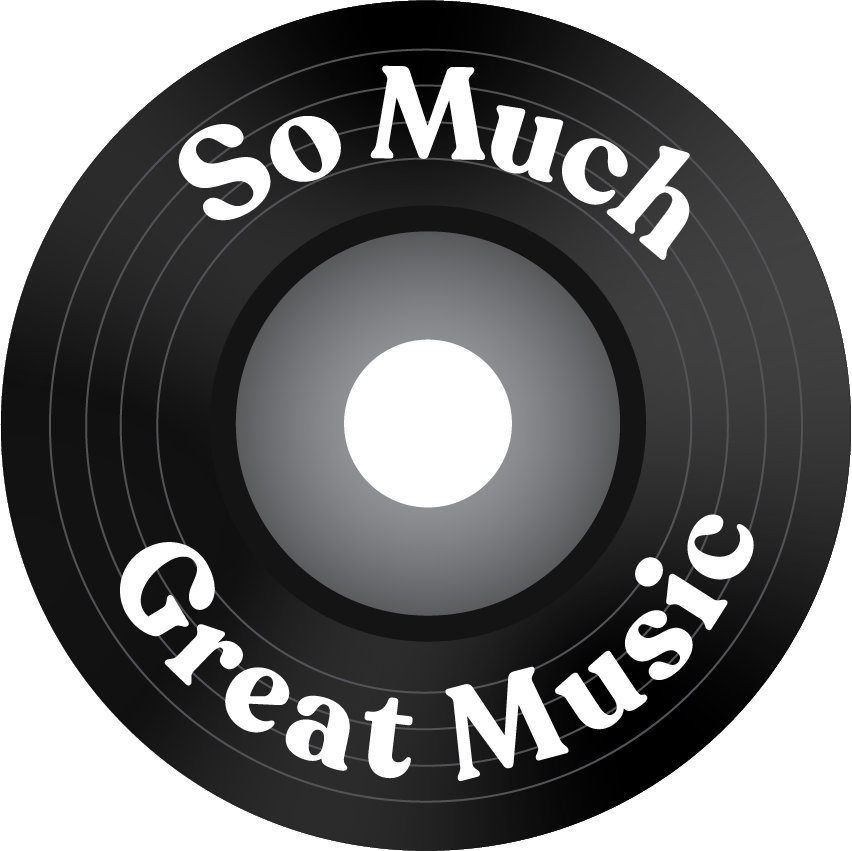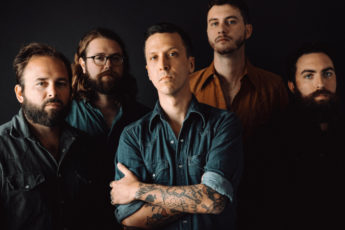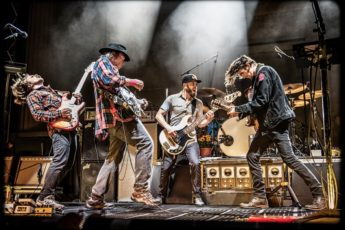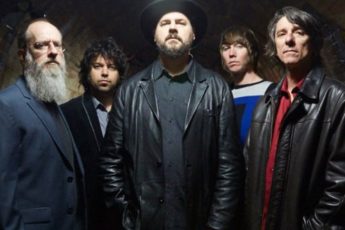I got back to the garden. Not MSG, not that garden, but the one about which Joni Mitchell wrote and Crosby, Stills, Nash & Young most famously sang: at the erstwhile home of Yasgur’s Farm, the mythical “garden” of Woodstock. This summer (this week, in fact) is exactly 50 years since “The Summer Of Love” culminated with “half a million strong” descending on that pastoral site in Bethel, NY¹ for what was billed as “Three Days of Peace, Love and Music” but moreover became, as a commemorative 2019 documentary just called it, “Three Days That Defined a Generation.” And, amazingly, the garden that hosted Woodstock all those years ago has actually re-grown, cultivated anew into a gorgeous 15,000 seat outdoor amphitheater set amidst the vast acreage of The Bethel Woods Center for the Arts, which opened in 2006. Yet, I made the pilgrimage not for some faded hippy reunion but for the biggest name in modern country-rock music, the reigning king of new Outlaw Country, the mighty Chris Stapleton.
Chris Stapleton’s All American Road Show, also featuring an absolute standout tandem of openers, Margo Price and The Marcus King Band, was making a stop in upstate N.Y., and I had been dying to catch him live ever since his mountainous tenor blew the doors off the country music world just four years ago. In that short time, the 41-year-old Lexington, KY native has released three genuine touchstone albums while also receiving a fair amount of recognition: five Grammys, seven Academy of Country Music awards, and ten Country Music Association awards, not to mention writing credits for artists ranging from Adele to Kenny Chesney, and Peter Frampton to Sheryl Crow. Now, people like me, trackers of what we steadfastly maintain is the “good music” and not the saccharine pop drivel saturating the popular markets, are frequently left bemoaning the fact that our virtuous acts are not sufficiently appreciated by the wider, mainstream audiences they clearly deserve. And as my wife & I stood amongst the teeming, sold-out crowd approaching the venue, I was stunned to see that it was not filled primarily with the 40- and 50-something oldsters I’d presumed, but by avid, eager devotees in their 20’s and 30’s, many partying like Wavy Gravy used to back in the original Woodstock days. Incredibly, I at last realized, Chris Stapleton had actually done it: in the parlance of music industry aficionados, he’d successfully crossed over.
So, pleasantly surrounded by the unexpectedly diverse audience, I settled in with exceedingly high expectations. Four years is a long time to wait for a show. And in short, Chris Stapleton absolutely did not disappoint. The band was suitably tight, absent Stapleton’s regular harmonizer and wife, Morgane (home following the recent birth of the couple’s 5th child), but appended by Mickey Raphael, legendary harmonica accompanist to seemingly hundreds, but most notably to Willie Nelson for only the last 45 years. And Stapleton was more than adequate handling a series of electric guitars that all looked a tad too small in front of his burly frame, bending enough strings to animate the crowd during his solos, and churning out rugged riffs that propelled many of his songs. But, of course, it was his ultra-powerful, full-throated vocals that drove both the band and the concert, and that most definitely sets him apart. With his singing, Stapleton has one of those hard-to-describe, hard-to-imagine talents: a raspy flame-thrower of a voice that somehow still never fails to remain perfectly in key, no matter how harshly he pushes it. Maybe consider it somewhat from the Joe Cocker school of vocal dynamics, but with even more range, dexterity, and refinement. What it is, in a word, is awesome.
Those locomotive vocals were never more in evidence than when powering through ‘Midnight Train To Memphis,’ Stapleton’s surging, off-the-rails rocker on the third of his three albums, “From A Room: Volume 2,”² his encore finale on this night, and the song I most came to see. After churning out the intro chords, his bellowed “Ooh!” (exactly 15 seconds into our featured recording) thrust the tune into its throbbing guitar refrain which Stapleton expertly rode through three minutes of thunder, all the way into the ‘Day Tripper’-reminiscent coda and the slashing final note. I got an enthusiastic and unsolicited fist bump from a guy half my age when it ended. Appreciative Stapleton followers of all demographics at Bethel Woods may have been feeling almost like original Woodstock fans decamping the same premises after Jimi Hendrix played the last song, ‘Hey Joe,’ that officially ended the weekend five decades earlier. One thing’s for certain, traffic was a bitch getting out for both.
¹Once slated to take place in the town Woodstock, as one would logically expect, the event was relocated mere weeks before it took place, to the town of Bethel. As Casey Stengel said, you could look it up.
²The album title is not “From A Room,” as in originating within some 4-walled enclosure, but “From A Room,” as in the historic RCA Studio A in Nashville, TN, where the musical production style and sound engineering technique known as the “Nashville Sound” was developed, and where Stapleton recorded both this and his preceding album.







Leave a Comment